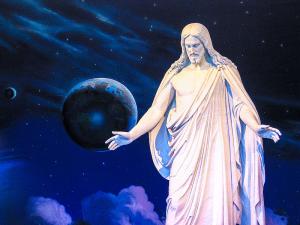At a new(ish) faculty potluck a few Saturdays ago, I mingled with other younger faculty amidst orange-colored casseroles, scampering toddlers, and bottles of craft-brewed beer. I struck up a conversation with the spouse of a new faculty member who asked me the question that everyone asks at such parties: “So what do you do?” I told him that I studied Mormons, and after he asked me if I was Mormon (for which he amiably apologized), he posed the question that I have been asked by folks in a zillion settings and contexts. “So, do you consider Mormons as Christians?” The questioner was not hostile. He was just curious. I glanced down at my ginger ale and said, “Well…yes…and no.” It all depends on how one thinks about how to define a religion. These are the three ways that I usually answer the “Mormons-as-Christians” question…even at parties. Yeah, way to kill a casual conversation! [1]
Yes, Mormons are Christians if we consider any religious group as constituted by those who self-identify as such. Mormons claim to be Christians, so they are, plain and simple. To develop this one step further, we can go beyond the simple act of self-identification and think about what happens when Mormons make their case for being Christian. Philosopher Alisdair McIntyre suggests that a religious tradition can be conceived as “an historically extended, socially embodied argument, and an argument precisely in part about the goods which constitute that tradition.” [2] In this model, religious traditions are really conversations where people argue and agree on what it is to be part of a community. We can talk about Mormons as Christians because Mormons self-identify as such and contribute to the ongoing conversation (or, more truthfully, the ongoing argument) about what it means to be a Christian. Of course, this is a fairly capacious model for what constitutes Christianity, and it would have to include groups that the vast majority of Christians do not want to claim, such members of the Christian Identity movement (white supremacist, racist Christians). Pushback on the “tradition as dialogue” model usually leads to advocacy for the next way of answering the Mormons-as-Christian question.
No, Mormons are not Christians if we set out an “essentialist” definition for Christianity that includes a trinitarian doctrine of God and a closed canon of scripture. Essentialist definitions pervade how most people define who is in or out of a group. Muslims have the five pillars that define their religion, we learn in high school. Buddhists have the three treasures and the eightfold path, we learn in college religion 101. Yet, when we look at people who identify as Buddhists and Muslims on the ground, we find all sorts of slippages between our essentialist definitions and what people do in practice. We find millions of practicing Buddhists who have no idea about what the eightfold path is. We read about Muslims in America, like Elijah Muhammad, who in the 1950s venerated W.D. Fard as Allah in the flesh–something well beyond the boundaries of most essentialist definitions for Islam. Of course, all communities will police their boundaries, a point eloquently explored by Taylor Petrey last week in his column. Muslims will want to say what true Islam is. Christians will want to do the same. Fine and well. But this is a very different task than analytically classifying something as a cultural phenomenon. Both are “normative” tasks but not in the same way.
Yes, Mormons are Christians if we think of any religion as being constituted by members that bear a series of “family resemblances” to other members. In his posthumously published Philosophical Investigations, Ludwig Wittgenstein tries to show how things can be related, more or less, without sharing any single, essential trait. Wittgenstein argues that a word like “game” can help describe many different practices, from tennis to chess. There is no one set of traits that these practices have in common, but they are more or less related. [3] Some scholars use this concept of “family resemblances” to describe how we can talk about “Hinduism” as a religion, [4] and I suggest that it might be employed to talk about Christianity, too. Mormons, then, are Christians because they bear a family resemblance to other groups also labeled by the term Christian. In this analogy, Methodists might share a different set of traits with Catholics than they do Mormons, but they are all related, more or less.
Of course, my strategies for answering the “Mormons-as-Christians” question side-step the cultural politics that inform why most people even ask the question in the first place. [5] Very, very few contemporary Americans, after all, ask, “Are Pure Land Buddhists really Buddhists?” (Some scholars say “no” to the latter question, by the way.) Most contemporary Americans ask if Mormons are Christians because they know Mormons, they’ve met missionaries who have tried to convert them, they live in the United States where Mormons make up 2% of the population, and a Mormon might end up being the POTUS. A host of other factors, such as the LDS belief that they are the “one true church,” helps to continue generating the question, too. Minority groups who insist that they are the true bearers of a much larger tradition invite—even thrive on—criticism from others. This last point brings up my final thought about this question. Despite the cringe-inducing effect that the question has on many LDS people, the presence of the almost rhetorical query about Mormonism and Christianity is actually a good thing for the LDS community—at least for the time being.
When contemporary Mormons have actively asserted their Christian identity, they have engaged in boundary-setting behaviors that have reinforced their sense of loyalty to their community and simultaneously allowed them to cross over boundaries. They have generated books, ad campaigns, blog posts, and, perhaps most famously, even subtitled their scriptures to defend their Christian identity. They have thought about how their religion coheres and have been forced to articulate that. They have reached out to others to prove their Christian identity, as service projects by many LDS young adults seem to illustrate. And, in contemporary pluralist America, being called non-Christian has provided Mormons with all the sociological benefits of persecution (the minority group coming together to defend an identity that seems under threat) with none of the serious after effects (real violence and real discrimination from others).
By many academic strategies for delineating the shape of Christianity, Mormons are Christians. Paradoxically, from a purely pragmatic point of view, Mormons should hope that most Americans do not come to that conclusion anytime soon.
Minus the last three paragraphs, I really said almost all of what I have just written at a party a few weeks ago. Well…perhaps I did not quote McIntyre. But I did run through my three ways of addressing the Mormons-as-Christians question. And my friend moved on to get another drink, leaving me with my ginger ale…
[1] My present column could be seen as one in a series on the topic of “Mormons-as-Christians” posted at this site. Previous columns were written by Taylor Petrey, Seth Perry, and Matt Bowman. My post and the former two posts were generated, in part, as a response to Ben Witherington, “Why Mormonism is not Christianity—The Issue of Christology” found here.
[2] Alisdair C. McIntyre, After Virtue: A Study in Moral Theory (Notre Dame, Indiana: University of Notre Dame Press, 1984), 222.
[3] Ludwig Wittgenstein, Philosophical Investigations, 3rd ed., trans. by G.E.M. Anscombe (New York: Blackwell Publishing, 2001), 27-28.
[4] For instance, Gavin Flood classifies Hinduism as a religion by using George Lakoff’s “prototype theory,” a further development of Wittgenstein’s concept of “family resemblances.” See Gavin Flood, An Introduction to Hinduism (New York: Cambridge University Press, 1996), 7.
[5] Seth Perry thoughtfully examines some of the cultural politics beyond what I mention in this paragraph. See his column linked here.











